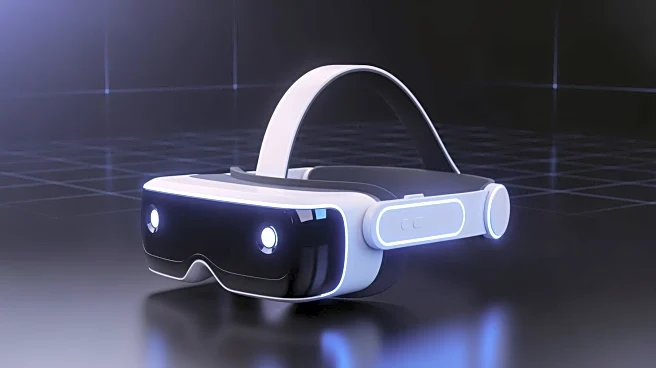What's Happening?
Several major technology companies are gearing up to release new augmented reality (AR) headsets in 2025, with Meta, Amazon, and Apple leading the charge. Meta has announced its display-equipped smart glasses, set to be available soon, while Amazon is reportedly developing consumer AR glasses to compete with Meta's offerings. Apple continues to focus on its premium Vision Pro headset, maintaining a price point of $3,499. The International Data Corporation (IDC) forecasts a 39.2% increase in AR/VR shipments in 2025, indicating a significant market expansion. These developments suggest a competitive landscape where companies are betting on different aspects such as price, content, and everyday usability to attract consumers.
Why It's Important?
The introduction of
new AR headsets by major tech companies is poised to significantly impact the consumer electronics market. With IDC predicting substantial growth in AR/VR shipments, these devices could become more mainstream, influencing how consumers interact with technology daily. Meta's focus on integrating displays into fashionable eyewear and Amazon's potential retail price disruption could make AR technology more accessible. Apple's continued emphasis on premium spatial content suggests a niche market for high-end users. The competition among these companies may drive innovation, lower prices, and expand the use cases for AR technology, potentially replacing some smartphone functionalities.
What's Next?
As these AR devices become available, consumer adoption will likely depend on the ecosystem of apps and content each company offers. Meta's and Amazon's strategies to integrate AR into daily tasks could broaden the appeal of these technologies. Apple's focus on spatial apps may continue to attract users interested in high-quality content. The success of these devices will hinge on their ability to provide practical applications that enhance everyday life. Developers will play a crucial role in creating engaging content that maximizes the potential of AR technology, influencing which devices gain popularity.
Beyond the Headlines
The push for AR technology raises questions about privacy and data security, as these devices may collect and process significant amounts of personal information. Additionally, the integration of AR into daily life could alter social interactions and consumer behavior, as users become accustomed to augmented experiences. The fashion-forward approach by companies like Meta suggests a cultural shift where technology becomes a seamless part of personal style. Long-term, the widespread adoption of AR could lead to new business models and industries centered around augmented experiences.

















